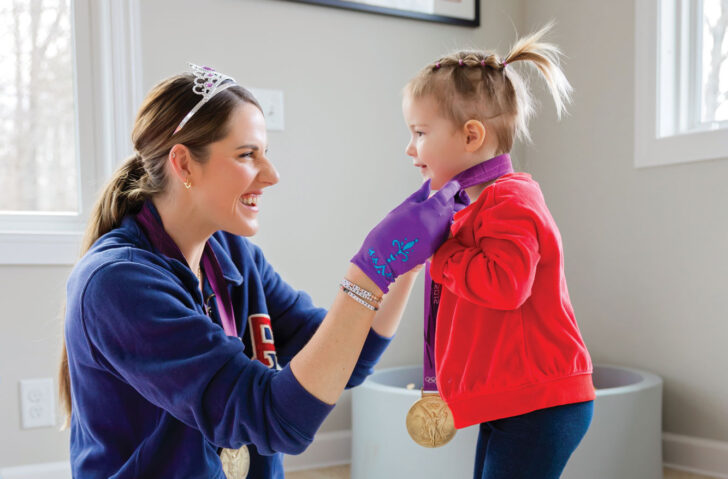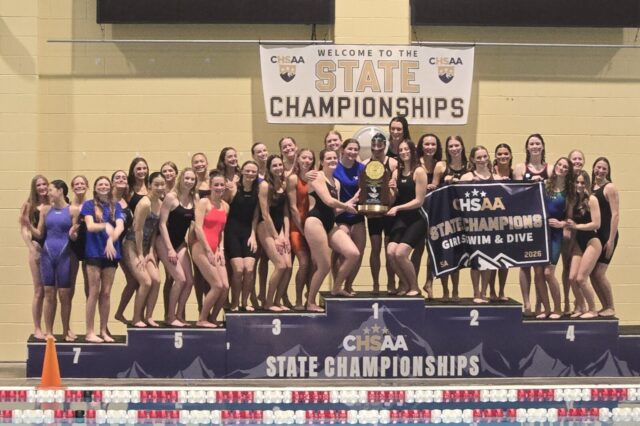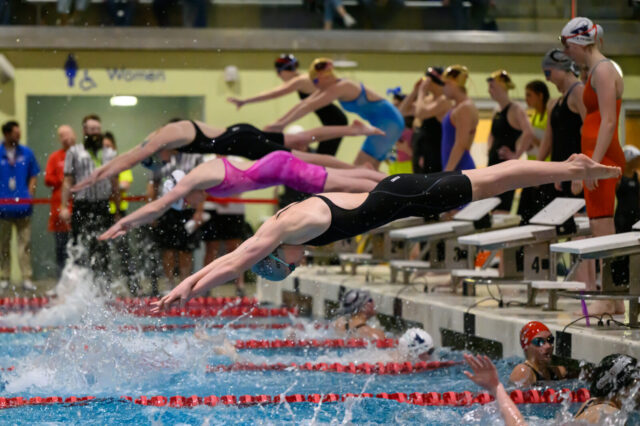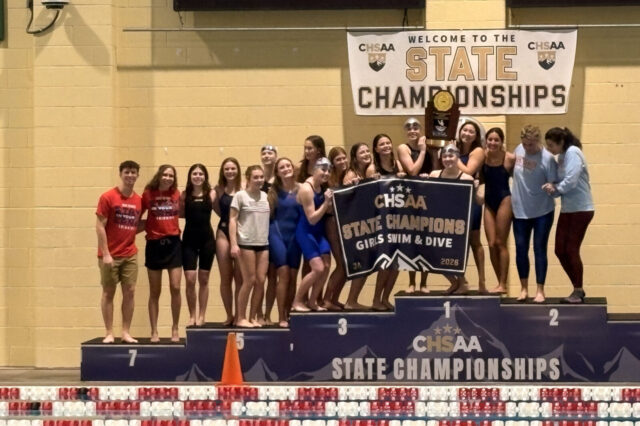Doug Ottewill: Get us caught up. What’s going on in your life these days?
Missy Franklin: I guess we’ll go back to when I retired in 2018, which was five years ago now. I finished up and I got my degree at the University of Georgia. My husband and I moved back to Colorado and we lived in Highlands Ranch for about a year, year-and-a-half. On the personal side, I got pregnant. I gave birth to my daughter, Sarah Caitlin, in August of 2021. So, we now have a 2-year-old. And anyone who knows me knows that being a mom has always been my end goal; my dream job. So, that has been a literal dream come true. From the professional standpoint, I’m still staying super involved in the sport. I’m still an ambassador for the USA Swimming Foundation, and I’m very active with them. I do
lots of work around some lessons and drowning prevention, which is super important to me. I work with Laureus Sport for Good’s Global, who I’ve been a part with since 2013; I’m now the vice-chair of the global board of the foundation. My work there has been super, super important to me. I’ve worked with Bridgestone; I’m working with Otsuka America, a pharmaceutical company, bringing awareness for polycystic kidney disease, which is what my family has and what my dad had his kidney transplant for. I released a swimsuit line with JC Penney. I have my own line of jewelry with our exercise brand – just a little bit of everything. I just started a podcast called “Unfiltered Waters” with Katie Hoff.
Ottewill: So, you’re not exactly bored.
Franklin: Not at all. I’ve stayed very, very busy. But it’s all doing things that
I absolutely love and I’m so passionate about and I’m so thankful to do. I do a lot of public speaking as well, so that’s really enjoyable for me.
Again, I can give back to the sport that gave me so much. But my husband and I moved to Nashville about two years ago in February, because he’s one of six children and almost his entire family is here in Nashville. We wanted to give Caitlin that chance to grow up with her aunts and uncles and cousins and her grandparents. My parents moved out here as well, about a year ago now. More importantly than babysitting, we just love our time together – doing family dinners and having them come over after school or having them drop by swim lessons. We wanted them so active and engaged, and for Caitlin to look back on her childhood and remember how much her Nana and Bubba were there. It’s been amazing. We’re absolutely loving it and we’re so happy here.
Ottewill: What’s been the most rewarding aspect of being a mom?
Franklin: Until you are a parent, it really is hard to put it into words. There’s a “Type A”, but if there were a type before “Type A,”, I would be that type. I am so overly prepared, I’m efficient, I’m a planner. So, when I was pregnant, I did everything. I did all the classes. I read all the books. Everything. And then this little baby gets here and you’re like, “Wait… what?” and I have no idea what I’m doing. It’s been the journey of a lifetime. We’re so grateful for everything that Caitlin has taught us about ourselves and the ways that she has encouraged us to grow and learn and communicate. And we’re just so thankful to her for what she brings to our family and who she is as a person, even at two years old. But, you know, I’ve been really working on self-trust and self-compassion. And I think that’s one of the things with having kids, those two things are so important – especially with your first kid. All the firsts are so hard, right? Because you’ve never experienced them before. Whether it’s a sleep regression or a really bad sickness or your first E.R. visit – all of these things are just so scary. But then you realize you get through every single one of them. You get through it. So, you just build this confidence as a parent and as a person over time – like, “Wait, I can do really hard stuff!” You would’ve thought as an elite athlete, I would’ve had that mentality going into it. But it’s so different when it when it comes to your heart that is living outside of your body, walking around. And so, I think that has been the most amazing part for me; now I just have
this amazing sense of belief and trust in Caitlin and in my husband, Hayes, and in myself. Of course, there’s still going be challenges to come, but I’m so proud of how we’ve handled all of them to date and we’ve made it through every single one.
Ottewill: Sounds like a highly competitive family; for those who don’t know, Hayes was also an elite swimmer for the University
of Texas.
Franklin: …and triathlete; he just did his first half- and his first full-Ironman. He’s still hard at it. We both are, but he’s still competing and he’s crushing it. Triathletes are a different breed. I’ll brag on him for one second. He had his full-Ironman in Florida in November. He crashed on the bike at mile 20 of the 112-mile bike ride, had to wobble his way to an aid station, had to wait for them to come and give him another rear tire because his tire had completely popped, got back on his bike. He’s tattered and bleeding and they checked him, and were like, “Well, you don’t have a concussion. So, if you want, you can keep going.” Did the whole rest of the bike race and then ran a fricking marathon. I was like floored. Like, I don’t understand. He’s competitive, infinitely more so than myself.
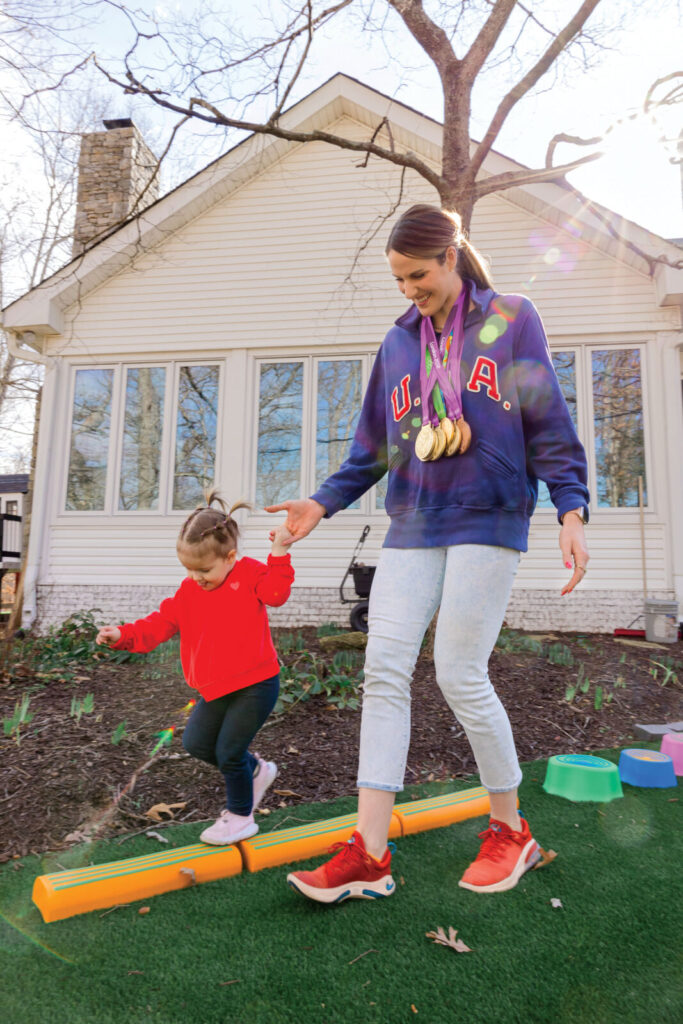
Ottewill: Given your combined backgrounds then, the natural assumption would be that your daughter will be athletic. There can also be pressure for a young athlete with accomplished parents. What do you think your approach or mindset will be when Caitlin comes of age and starts showing interest in sports or, specifically, swimming?
Franklin: We’ve talked about it a lot and it’s a question that we get a lot. It’s something that we’re both very, very honest about. We were both so fortunate to have had parents that encouraged us to follow what we’re passionate about. And that’s exactly what we’re going do with Caitlin. We were put in everything, both of us as kids, we did every sport. We were given the opportunity to find what it was that we loved. And we’re so thankful for having had that example set for us. I think sports have obviously given both of us so much, that if she wants to be involved in sports, we would love that; so we’re going to give her that option. We’re going introduce her to whatever she seems interested in.
And she might find something she’s passionate about – amazing.
If she doesn’t – amazing.
If she wants to do theater, great. I love theater. We know that talent only gets you so far. Passion and joy and fulfillment, that is what we want for her above all else. And if that’s in sports, great. If it’s not, great. If it’s not in swimming, honestly, I really don’t think we would mind not sitting at a three-day long swim meet every weekend. But we’ll see. She’s obviously in swim lessons. She’s in a swim lesson every single week. She has been since she’s been six months old. And we’re honest about this, too. She doesn’t love it; she’s kind of indifferent. She doesn’t love being on her back. She doesn’t love water. I was the baby that wouldn’t get out of the pool. I was diving down and she’s just not there. That might change over time, and it might not. And that’s okay. She’s learning how to swim because it’s a life skill and it’s so important for her health and safety. But we’ll put her in summer league and if she does a year and is like, “No,” then we’ll be like, “Alright, you finished your commitment, let’s try something else.”
Ottewill: Think back to when you were 13. You competed in the 2008 U.S Olympic Team Trials. That’s unimaginable for most. Looking back, what was your mindset? Was it fun? Was there pressure?
Franklin: I was genuinely just having the time of my life – and that’s how I was when I was 17 in London, too, world’s biggest stage or not. I was just having fun. Swimming is brutal. It’s a tough, tough sport.
It is a lot of time, a lot of hours. It’s a lot of commitment – and a lot of sports are like that. So, for me it was like I put in all this hard work, but I genuinely enjoy that process of working hard so when I get to the swim meets, oh my gosh, that’s just the fun part.
Right? All the training is done. Literally now you’re just going to go out and race. That was just always my mentality, especially when I was in a meet like the Olympic trials. I mean, I’m 13 and I’m getting in a warm-down lane with Michael Phelps or Natalie Coughlin or Nathan Adrian. and I’m like, “This is insane! This is so cool!” It was such a whirlwind. I really did just enjoy myself at the trials. But then I remember leaving it and that was kind of my big “a-ha” moment, like, alright, that was really cool and really fun – and I knew I wasn’t going to make the team this time – but now I’ve seen it in person. I’ve literally watched someone’s face as they’ve made an Olympic team and saw the team get crowned. And I want that. I know I didn’t have a shot this time, but next time I come back here, I’m going to have a shot, and I don’t care what it takes to get there, but I’m going to have one. It was kind of wild to have that kind of moment of clarity and intensity at 13. But I just knew. I was like, this is it. This is what I’m meant to be and called to do and I’m going do everything I can to make it happen.
Ottewill: Whether it’s your kid, or any young person getting into sports at a competitive level, what’s the best advice you ever received or would give?
Franklin: It’s kind of a mix. (The two most important things) are the importance of balance and the importance of rest. I really focus on those two things because my motto in life, for this exact purpose, is that “happy swimmers are fast swimmers.” That is just so relevant and so clear throughout my career. I was at my best when I was my happiest and when I was enjoying, not just the gold medal moments, but truly the everyday process of getting there. In order to have that joy and happiness, you need to have balance and you need to have rest. With balance, it’s going to be a lot of hard work – putting your head down and just getting it done even on the days that you don’t want to or don’t feel like it – but then balancing that out and making sure you’re also getting good time with your friends, going to see a movie, doing quality family time, whatever that looks like.
And then it’s having good nutrition and having good sleep. All of these things that are going to impact your training just as much as your actual training when you put it all together. And then there’s the importance of rest. It is wild how hard kids are on themselves these days. Just some of the conversations I’ve had; my heart breaks with them when they’re telling me what they’ve been through and what they’ve experienced and how they’re feeling. I look at them and I’m like, “Have you taken a break? Like, have you just stopped for a second?” And they literally look at me and they’re like, “We didn’t know that was an option.”
That’s why I’m so thankful for the athletes that we have in our world today who are so elite and so outspoken about mental health. You have someone like a Caeleb Dressel, who came home after the Tokyo Olympics and after Worlds and took eight months off. That’s unheard of to do that. And it’s just setting such a good example; sometimes we need a break. Sometimes we don’t know how long that break is going to be, and that’s really scary, but you’ve got to take it. Because if you just keep pushing through stuff and harboring it and pushing stuff down, you’re never going to heal and you’re never going to be at your full potential. It’s just so important to do that from a physical and mental health perspective, because you can be in the best shape of your life ,and if you are not there mentally, it does not matter. So why would you do that? Why would you work so hard, put all this effort into physically being the best you’ve ever been, only to completely neglect the mental and emotional side of it so that you’re fully unprepared for whatever’s to come. It’s just so important for me to talk – especially to younger athletes – about all of that, and let them know that rest is not only okay, but a crucial part of reaching that level of success.
Ottewill: That’s got to carry a lot of weight coming from someone who’s as accomplished as you are. The message might hit differently than if it comes from a coach or parent.
Franklin: Even now, it’s so funny because I’m experiencing that with a 2-year-old. I’ll tell Caitlin to do something, and she won’t do it. But if one of my girlfriends is over and she tells her to do it, she’ll stop and do it. But we get that from parents all the time.
(Parents will say), “I think they need to hear it coming from someone that’s not me.” I want to normalize that for parents, too, because by no means are the parents doing anything wrong; it’s just that they’re “the parents.” Your kids may hear something differently from someone else than they hear it from you, even if you’re saying exactly the same thing. That’s also why we really try and emphasize the importance of mentorship. We focus more in the sport of having a mentor that’s not a parent, that’s not a coach, but who is another adult figure that you trust that is a great role model and example that your child can talk to about things, and just get kind of a different perspective and a different voice than their head, so they can hear it a little bit differently to really help it sink in.
Ottewill: What are your fondest memories of competing for Regis Jesuit High School?
Franklin: High school is amazing. I am so thankful for the opportunity I had from all four years. This is why we talk so much to young athletes about enjoying the journey, because the destination is great, but when you look back on it, the things you’re going to think about aren’t actually you standing on a podium and getting a medal. It’s going to be the smallest, most insignificant details that you are going to remember that bring you like the most joy.
I remember one Saturday morning practice; it was so hard. We had just finished, and the song “Hey Juliet” came on. It was like old school. We had all grew up singing it, and every single one of us just like lost our mind. We’re screaming it at the top of our lungs, in the water, dancing. Just having so much fun. I look back and I’m like, if I could relive any moment of my high school career, it would be that practice.
Obviously winning state titles was amazing – helping my team do that, jumping in the water with the coaches – of course those moments are so, so special. But it was just such an amazing group of young women. I was so thankful for my entire experience at Regis, and of course, how it extended into my experience on the swim team. And obviously, Coach Nick Frasersmith and Brian Davenport were such a huge, huge piece of that. There was such an amazing culture and such an amazing environment. You just felt safe and supported and encouraged. And I don’t think we can stress the importance of that enough for young women growing up in today’s day and age.
Looking back now, what were some of the experiences you gained in high school swimming that helped you whether it was in international competition or college?
One of the hardest lessons I had to learn was when I came back from London, and made the decision to swim for my high school team that senior year, and the pushback I got after making that decision. It was so unexpected and so wild to me, because I had gone to my team, I had gone to my coaches, I had asked how they felt about it, and they were the same as me. They were like, “You swam for years, why would you not swim your senior year? Of course, we want you to swim your senior year with us.”
And that was how I felt – of course I would swim my fourth year. How could I not swim my senior year with my team? So then when I got that pushback, I was heartbroken. Because obviously people don’t know me at all if they think there’s any part of me that was doing this to take away from someone else. That is the last thing. But then, of course, that’s where my mind went, right? I want to give others the opportunity and I don’t want to make this about me.
The whole point of doing this is making it about the team. It was my first real kind of conflict of understanding that when you are a public figure, which is what I was at that point, you can’t make everyone happy, no matter how hard you try. That was a really tough lesson for me to learn, but it was my first instance of “I’m going to stick with my gut.” And I had talked to the people that I love and care about and that know me, and that know my intentions, that agree with me on this decision. It wasn’t always easy, but looking back, I’m so, so glad that I did it. And it was really my first lesson of “You’re going to get opinions sometimes and you’re not going to have asked for them.” Sometimes they’re going to hurt and they’re going to stick with you. And you just have to keep trusting yourself and your heart and your intentions more than anyone else ever will – and have faith in those and knowing that you’re making the best decisions you can.
Ottewill: With regard to that very topic, over the years it seems like you’ve been asked if you regret not turning pro immediately following the 2012 Olympics thousands of times. Let’s go another direction… With a decade of 20/20 hindsight at your disposal, what about your decision are you most proud of?
Franklin: It’s such a different environment these days right now with NIL. It’s really different, and it’s hard to even look back and even say what I learned because it’s almost like inapplicable for athletes these days, because they now have the opportunities that I didn’t – which is amazing and I’m so happy about that. I think what I would say is that I think when your sport becomes your job, there is a transition that goes along with that that you aren’t always expecting. It is different when you now have more pressure. You have a company that you are representing, you have a brand that you are representing, you’re doing a photo shoot, perhaps you’re posting on social media for them. You feel that pressure in a way that you’ve never experienced because you’ve never done this before. And all of a sudden, your sport becomes bigger and more.
And I don’t think, at 17 years old, I could have handled that. Because honestly, I had a hard time handling it at 20. So that’s why – especially these days with athletes – that’s so much of what we talk about. This is amazing – you should absolutely be able to use your own name and likeness for all the hard work that you have done. But make sure you’re talking to someone or you’re having conversations with your coach or a therapist or a sports psychologist to help you go through this transition. Let’s do it proactively instead of reactively, so we’re going into it prepared and feeling like we have an idea of what to expect and how things might change, versus, coming in six months later and not understanding what’s going on.
Ottewill: Do you go back, and in your mind, paint a picture of what your senior year of high school or your freshman year of college would’ve been like had NIL been a part of it?
Franklin: It’s so hard to say. Honestly, I have no idea. But that change was very unexpected and very hard for me when I turned professional in 2015 – and it was so exciting. I don’t want to miss out on that part; it was so amazing working with these iconic brands and doing commercials for United and going to the Super Bowl with Visa. It was a dream come true. I was having the most amazing life experiences, but I didn’t know how to deal with balancing and managing the new expectations and pressure that came along with seeing my face plastered on walls and on orange juice containers. I didn’t know how to do that.
So going back, I think I would’ve had a really hard time with that even just three years earlier than where I was. Things do change a little bit when you involve money and getting paid for something that, up until this point, you’ve really just been doing for fun, for competitive purposes. It does shift.
Ottewill: Sportswomen of Colorado turns 50 this year, and you’ve known the organization for quite some time, first as a “most promising”honoree when you were 12 and ultimately as the youngest person ever inducted into the organization’s hall of fame. What has it meant to you to be so highly decorated by such an organization?
Franklin: Being honored by Sportswomen of Colorado was such a massive honor. Even at that young age, I had an understanding of the importance of the women who had come before me; who had given me these opportunities and this platform that I may not have had otherwise. And now it’s my duty to carry it on. And I really do think I understood that at 13 – but especially being involved with something like Sportswomen of Colorado – it was so humbling, it was so motivating, and I think it was a huge piece that led into the importance of being a role model. Going to events like that and being around these other incredible athletes, these other incredible women who were making such a difference, and having such an impact, and knowing that that’s exactly the route that I wanted to take, as well.
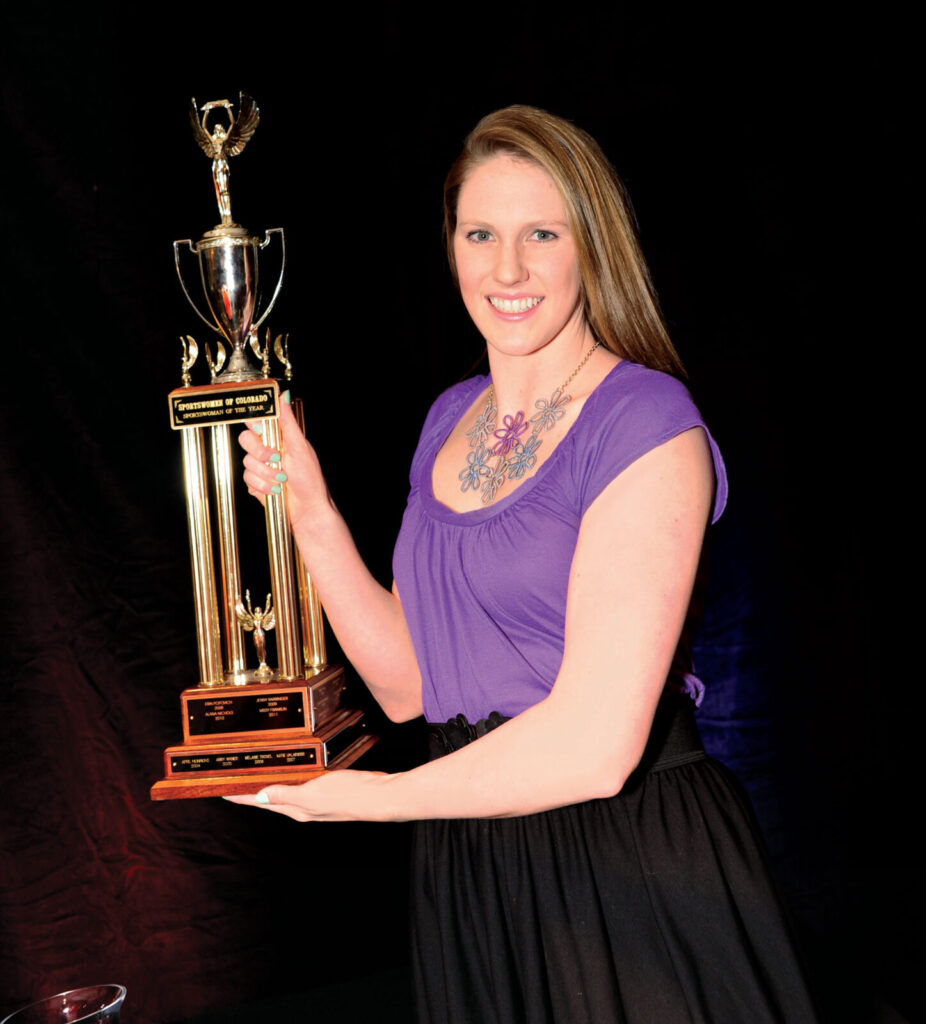
Ottewill: Obviously, Sportswomen of Colorado has always celebrated the athletic achievements of women – including yourself – but who were some of your role models?
Franklin: My two big ones are Amy Van Dyken and Lindsey Vonn. Amy was such an icon, not only in swimming but just in sports in our state. And Lindsey I absolutely adored; I thought she was such a badass – excuse my French – but there’s no other word for it. In the swimming space, Natalie Coughlin was always one of my greatest role models. And then Kerri Walsh Jennings. I definitely felt like I grew up with incredible role models on the women’s sporting front, and it’s been amazing to see how that has continued to evolve and grow. And I just feel like the women athletes that we have today to look up to, we couldn’t ask for better people or representative of their sport – or of women. It’s just so cool to see that.
Ottewill: It feels as if women’s sports are inching closer in terms of being as popular as men’s. There are new leagues popping up, better endorsement deals for women, more television programming. What’s your take on the state of women’s sports? How far have they come? How far can they still go?
Franklin: It’s an interesting question for me because historically – and again, I’ll speak for myself – I don’t think swimming have had the same disadvantages (in terms of) disproportionate pay and acknowledgement of women in the sport over men. You look at something like soccer, where there’s been so much of a battle fought there by the US Women’s National Team, and there is still such a long way to go. I think we have made progress because of the women today that are fighting so hard, not just for themselves, but for the future generations of the sport. I think it’s different depending on different sports. I just met Carmen Jordá, who’s one of the few Formula 1 female drivers. And that was a fascinating conversation to have with her – about the female presence in F1. The comparison of that sport – females and male – could not possibly be more juxtaposed. So, I definitely think there are sports where that gap is huge and there’s a long way to go. And there are sports where it is more equal; I’m thankful to have been in one of those sports, so it may not affect me personally, but it doesn’t make it any less important for me to fight with the other women who it does affect personally.
Ottewill: You’ve accomplished many, many things as a swimmer, you’ve been an international celebrity and you’re well into this next chapter of your life as a mother. Did you ever imagine this ride, and perhaps more importantly, what’s next?
I am so proud of everything up to this point. I’m just going to keep going. I feel so fulfilled with everything that we’re doing. The podcast venture has been really, really exciting. That’s a space I’ve been really wanting to get into, and a space that I feel like Katie Hoff and I can make a huge difference within the swimming space and beyond.
Franklin: So, that’s something that I’m really excited about doing. We launched officially in January, so I’m so excited about that. And then obviously my family will always be my No. 1. I feel so fortunate that I get the best of both worlds, and that I can be a working mom, but I can also be essentially a full-time stay-at-home mom, as well. I’m so thankful for the help that we do have, and the resources that we
have that allow me to do that. So obviously it’s being a mom, being a wife, being a daughter – those are always No. 1. But then it’s continuing to build on the platform that swimming gave me, that I was able to create during my athletic career, and to continue to make an impact, continue to make a difference and continue to inspire.
